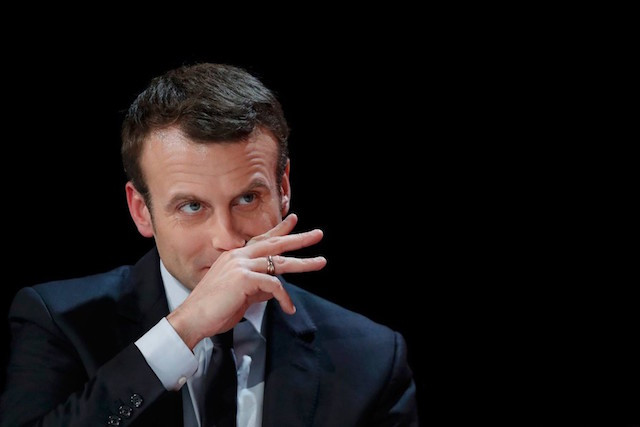The French president has so far made no public statement over the damaging political and personal scandal except to let it be known he considers the behaviour of the security officer Alexandre Benalla, a deputy chief of staff at the Élysée Palace, “shocking and unacceptable”
After an extraordinary parliamentary hearing on Monday, a cabinet minister and a senior official who had known about Benalla’s attack on a young man and woman at the May Day demonstration for more than two months, passed blame for it not being reported straight back to the Élysée.
The interior minister, Gérard Collomb, and prefect of police, Michel Delpuech, told MPs that Benalla’s superiors at the Élysée were responsible for reporting his actions under France’s Penal Code.
Benalla, said to be a close and personal aide to the president, was initially suspended for 15 days but allowed to keep his official car, complete with flashing blue lights, and a grace-and-favour apartment in central Paris. He then returned to work at Macron’s side.
It was only when Le Monde revealed video footage of the attacks by Benalla last week that he was questioned by police and sacked by the Élysée.
The 26-year-old was on Sunday put under official investigation for “gang violence” and impersonating a police officer. A second man employed by Macron’s centrist La République en Marche party, Vincent Crase, was also indicted for violence against demonstrators. Three senior police officers were put under investigation for allegedly passing video footage of the assaults to Benalla.
The national assembly postponed a debate on constitutional reforms to hold an extraordinary session on Monday on what has become known as the “Benalla affair”, with opposition MPs accusing the president and government of a cover-up.
Macron also cancelled a visit to the 17th stage of the Tour de France scheduled for Wednesday.
Questioned by MPs for more than two hours, Collomb said Benalla’s presence at the demonstrations as an observer was “legitimate”, but his violent behaviour was “unacceptable”. He admitted he had no idea how Benalla had obtained a police armband and radio.
Collomb said when he learned of Benalla’s behaviour 24 hours later he believed that appropriate action was being taken against the security officer. It was not until Le Monde published new videos and information on 19 July, showing Benalla wearing a police armband and carrying a police radio, that he considered it necessary to know more about the assault.
During the session, Collomb said responsibility for sanctioning Benalla rested with the president’s office or the police prefecture. He said Benalla, who trained as a gendarme in June 2009 but later left the service, held the grade of Lt-Col in the “operational reserves”.
Asked if it was normal for Benalla to be carrying a weapon, the minister replied his request to carry a weapon was twice refused by his predecessor in 2013 and by his ministry in 2017. He obtained a permit last year, but not from the interior ministry, Collomb added. French media have reported that the president’s office requested Benalla be issued with a firearm.
Delpuech told the inquiry he had not been informed that Benalla would be attending the 1 May protests as an “observer”.
“I was not asked anything of the kind,” he said, adding that he was astonished when he discovered Benalla’s presence at the demonstrations at a debrief meeting later that day.
Asked why his officers had handed over videotape of the assaults to Benalla, Delpuech said he believed this “unacceptable and condemnable individual behaviour” was the result of some “unhealthy friendships”.
Ugo Bernalicis, from the leftwing party France Unbowed, reminded Collomb of article 40 of France’s penal code, which states that any official public officer who learns of a crime or offence must transmit this to the prosecutor.
Marine Le Pen, the far-right leader, asked how a presidential bodyguard could be so close to the French president when the interior ministry appeared to know nothing about his background. She asked if Benalla had been subject to security vetting.
Gilbert Collard, an independent rightwing MP close to Le Pen, launched into a verbal attack on the minister, saying: “We have the impression everything happened without you knowing … you appear to have knowledge of nothing. I understand the minister’s embarrassment … how did he, interior minister, not know all this?”
The scandal is the subject of inquiries at the national assembly and the senate as well as an internal police inquiry. The Élysée has announced an internal staff reshuffle.
Macron launched a belated damage limitation exercise as the scandal ballooned. The French leader, who had remained silent until now, gave a first reaction on Sunday evening via advisers who reported he considered Benalla’s behaviour “shocking and unacceptable” and spoke of “clear failings” at the Élysée.
He apparently let it be known he would speak publicly on the subject “when he judged the moment right”.
The Elysée response was not enough to reassure the French media. Le Figaro summed up political and public anger in a critical editorial, saying: “To those who wanted to believe in ‘the new breath’ of Macronism and ‘renewal’ of political behaviour, the Benalla affair brings you spooks, black offices, parallel police, princely acts and special privileges.”
Kim Willsher in Paris
